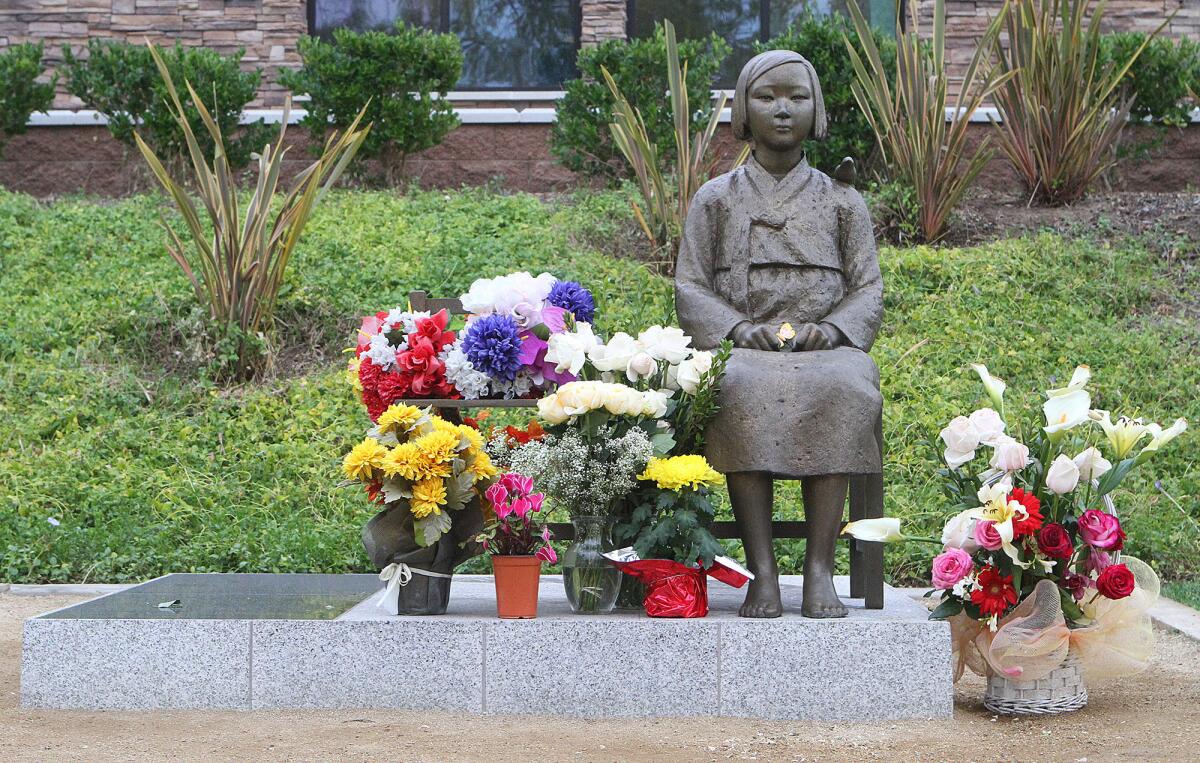Firm shies from comfort-women statue lawsuit

Despite filing court documents this week opposing Glendale’s request to dismiss a federal lawsuit calling for the removal of a city statue honoring women used as sex slaves by the Japanese Imperial Army during World War II, the law firm representing those opposed to the memorial has resigned.
The change comes after Mayer Brown, considered a top 20 global law firm, was criticized by several in the legal industry for taking on the case in the first place since the plight of the former sex slaves, known as comfort women, has been recognized by international historians and government officials in Japan and the United States.
The firm asked to step down as top management became concerned about being seen as a corporate entity that denies the history of sexual enslavement, according to the website of GAHT-US Corp., a nonprofit group and one of the three opponents that filed the lawsuit.
The other two opponents were Koichi Mera, a Los Angeles resident and founder of GAHT-US Corp. and Michiko Gingery, a Glendale resident.
In separating from the case, Mayer Brown has agreed to reimburse the plaintiff’s fees and find a replacement, according to the website statement, which was translated from Japanese. GAHT-US Corp. officials also wrote they are confident the attorney swap will not impact the case and asked supporters not to worry.
On Tuesday, the day after Mayer Brown filed its opposition papers, U.S. District Judge Percy Adams approved a substitute attorney for the plaintiffs: William B. DeClercq of Pasadena.
Bob Harris, spokesman for Mayer Brown, confirmed in an email that the law firm requested to be removed from the case with their client’s consent, but declined to comment further.
Mayer Brown attorneys have argued in court documents that the comfort-women statue, installed in Central Park in July, challenges the federal government’s power to conduct foreign affairs and set the supreme law of the land.
The City Council approved the statue in order to honor the estimated 80,000 to 200,000 women from Korea, China and other countries who were forced to work as prostitutes in military brothels against their will. But it has whipped up controversy as several conservative Japanese politicians deny the military’s involvement in the comfort-women system of the time.
Glendale attorneys, who are working pro bono on behalf of the city, asked the judge to dismiss the lawsuit, filed in February, because Glendale’s right to free speech should protect the 1,100-pound monument, which features a young woman in Korean garb sitting next to an empty chair.
However, in its latest filing, Mayer Brown attorneys disagree.
“When the council permitted the emplacement of the monument, it did so as the Glendale City Council, not as individual council members,” according to court records. “The First Amendment does not apply to that decision.”
Mayer Brown attorneys also stated the lawsuit does not seek to challenge historical record, although their clients, the statue opponents, have been doing so for months.
--
Follow Brittany Levine on Google+ and on Twitter: @brittanylevine.
ALSO:
Alleged shoplifting pair sought by police
Rug made by Armenian orphans to go on display at White House